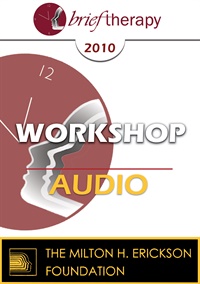BT10 Workshop 34 - The Developmental Model of Couples Therapy: Integrating Attachment, Differentiation and Neuroscience in Couples Therapy - Ellyn Bader, PhD
- Average Rating:
- Not yet rated
- Topic Areas:
- Attachment | Couples Therapy | Neuroscience | Workshops | Developmental Therapy Model | Differentiation
- Categories:
- Brief Therapy Conference | Brief Therapy Conference 2010 | Pioneers in Couples and Family Therapy
- Faculty:
- Ellyn Bader, PhD
- Duration:
- 1:54:30
- Format:
- Audio Only
- Original Program Date:
- Dec 12, 2010
- License:
- Never Expires.
Description
Description: The workshop delves into couples therapy by integrating attachment theory, differentiation, and neuroscience. Participants learn about relationship developmental stages, attachment styles, and conflict resolution techniques like the "ouch" method. The session explores challenges with different couple types, gender dynamics, and personal histories, using case studies to demonstrate how self-disclosure, addressing unresolved issues, and differentiation-based approaches can help couples develop deeper emotional connections and personal growth.
Syllabus Description: Using a developmental lens is powerful to lead couples to make sustained change. Learn to use developmental principles to assess what is wrong and to direct your treatment decisions. Videotapes and clinical case examples will be used throughout the workshop to demonstrate how to promote development in hostile and conflict avoidant couples.
Educational Objectives:
- Delineate 5 stages of couples’ development.
- List 3 methods of managing sessions along a productive course.
- Describe how to utilize neuroscience findings to interrupt hostility in angry couples.
*Sessions may be edited for content and to preserve confidentiality*
Credits
Handouts
| Timestamped Transcript (1.3 MB) | 34 Pages | Available after Purchase |
| Ericksonian Learning Snapshot (278.2 KB) | 3 Pages | Available after Purchase |
Faculty

Ellyn Bader, PhD Related Seminars and Products
Ellyn Bader, PhD, is a founder and director of The Couples Institute in Menlo Park, California. As a clinical psychologist, workshop leader, author, and speaker, she is dedicated to helping couples create extraordinary relationships. Over the past 30 years she has trained therapists in couples therapy throughout the United States as well as Europe, Asia, South America, and Australia. She served as a Clinical Faculty in Stanford University School of Medicine for 8 years.


